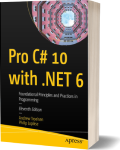Pro C# 10 with .NET 6
Programming
Book Details
Book Title
Pro C# 10 with .NET 6
Author
Andrew Troelsen, Phil Japikse
Publisher
Apress
Publication Date
2022
ISBN
9781484278680
Number of Pages
1680
Language
English
Format
File Size
11MB
Subject
Programming
Table of Contents
- Table of Contents
- About the Authors
- About the Technical Reviewers
- Acknowledgments
- Introduction
- Part I: Introducing C# and .NET 6 Chapter 1: Introducing C# and .NET 6 Chapter 2: Building C# Applications
- Chapter 1: Introducing C# and .NET 6
- Chapter 2: Building C# Applications
- Part II: Core C# Programming Chapter 3: Core C# Programming Constructs, Part 1 Chapter 4: Core C# Programming Constructs, Part 2
- Chapter 3: Core C# Programming Constructs, Part 1
- Chapter 4: Core C# Programming Constructs, Part 2
- Part III: Object Oriented Programming with C# Chapter 5: Understanding Encapsulation Chapter 6: Understanding Inheritance and Polymorphism Chapter 7: Understanding Structured Exception Handling Chapter 8: Working with Interfaces Chapter 9: Understanding Object Lifetime
- Chapter 5: Understanding Encapsulation
- Chapter 6: Understanding Inheritance and Polymorphism
- Chapter 7: Understanding Structured Exception Handling
- Chapter 8: Working with Interfaces
- Chapter 9: Understanding Object Lifetime
- Part IV: Advanced C# Programming Chapter 10: Collections and Generics Chapter 11: Advanced C# Language Features Chapter 12: Delegates, Events, and Lambda Expressions Chapter 13: LINQ to Objects Chapter 14: Processes, AppDomains, and Load Contexts Chapter 15: Multithreaded, Parallel, and Async Programming
- Chapter 10: Collections and Generics
- Chapter 11: Advanced C# Language Features
- Chapter 12: Delegates, Events, and Lambda Expressions
- Chapter 13: LINQ to Objects
- Chapter 14: Processes, AppDomains, and Load Contexts
- Chapter 15: Multithreaded, Parallel, and Async Programming
- Part V: Programming with .NET Core Assemblies Chapter 16: Building and Configuring Class Libraries Chapter 17: Type Reflection, Late Binding, Attribute, and Dynamic Types Chapter 18: Understanding CIL and the Role of Dynamic Assemblies
- Chapter 16: Building and Configuring Class Libraries
- Chapter 17: Type Reflection, Late Binding, Attribute, and Dynamic Types
- Chapter 18: Understanding CIL and the Role of Dynamic Assemblies
- Part VI: File Handling, Object Serialization, and Data Access Chapter 19: File I/O and Object Serialization Chapter 20: Data Access with ADO.NET
- Chapter 19: File I/O and Object Serialization
- Chapter 20: Data Access with ADO.NET
- Part VII: Entity Framework Core Chapter 21: Introducing Entity Framework Core Chapter 22: Exploring Entity Framework Core Chapter 23: Build a Data Access Layer with Entity Framework Core Chapter 24: Test-Driving AutoLot
- Chapter 21: Introducing Entity Framework Core
- Chapter 22: Exploring Entity Framework Core
- Chapter 23: Build a Data Access Layer with Entity Framework Core
- Chapter 24: Test-Driving AutoLot
- Part VIII: Windows Client Development Chapter 25: Introducing Windows Presentation Foundation and XAML Chapter 26: WPF Controls, Layouts, Events, and Data Binding Chapter 27: WPF Graphics Rendering Services Chapter 28: WPF Resources, Animations, Styles, and Templates Chapter 29: WPF Notifications, Validations, Commands, and MVVM
- Chapter 25: Introducing Windows Presentation Foundation and XAML
- Chapter 26: WPF Controls, Layouts, Events, and Data Binding
- Chapter 27: WPF Graphics Rendering Services
- Chapter 28: WPF Resources, Animations, Styles, and Templates
- Chapter 29: WPF Notifications, Validations, Commands, and MVVM
- Part IX: ASP.NET Core Chapter 30: Introducing ASP.NET Core Chapter 31: Diving Into ASP.NET Core Chapter 32: RESTful Services with ASP.NET Core Chapter 33: Web Applications with MVC Chapter 34: Web Applications using Razor Pages
- Chapter 30: Introducing ASP.NET Core
- Chapter 31: Diving Into ASP.NET Core
- Chapter 32: RESTful Services with ASP.NET Core
- Chapter 33: Web Applications with MVC
- Chapter 34: Web Applications using Razor Pages
- Index
